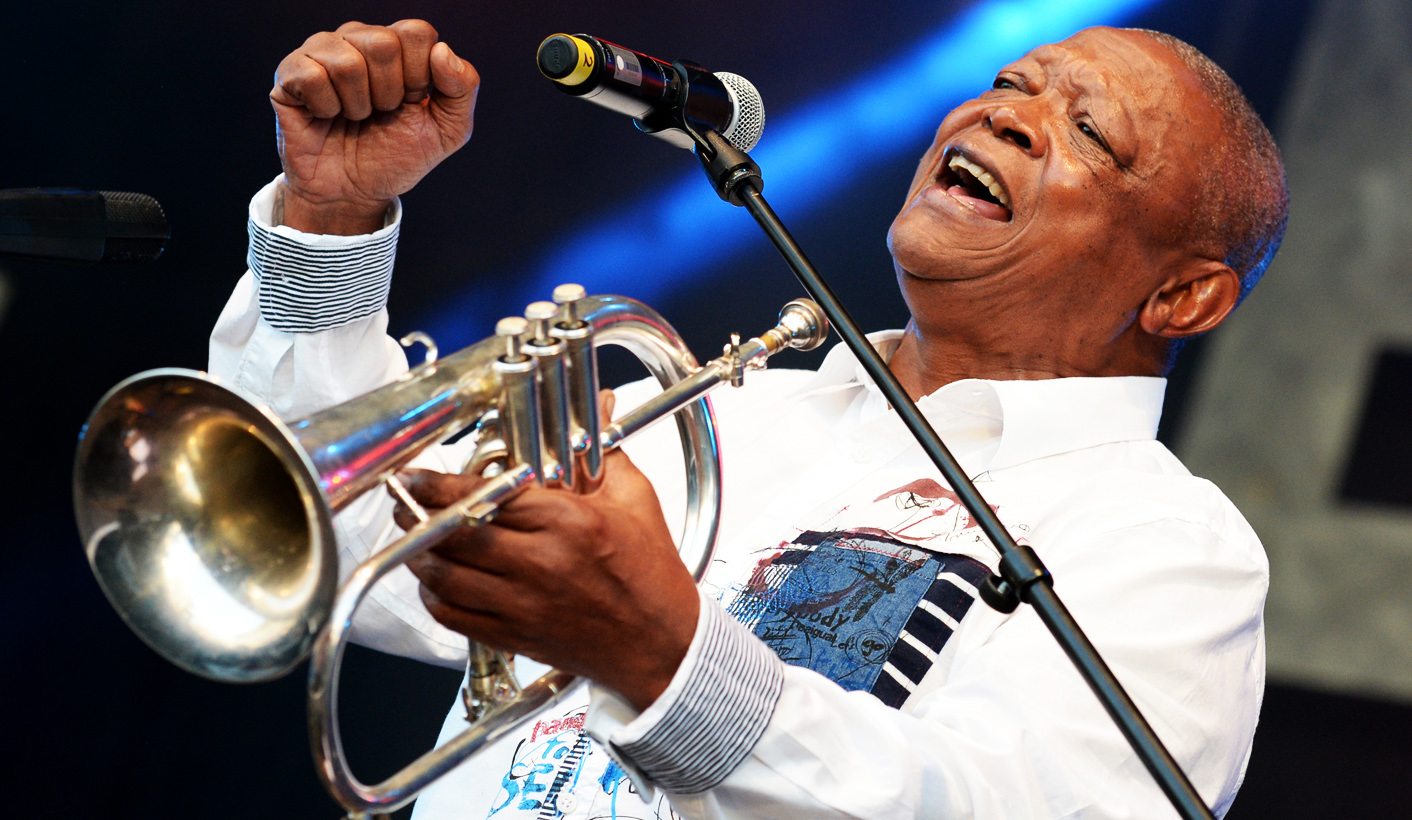Hugh Masekela’s citation for his honorary doctorate from Wits concluded: “Hugh Masekela’s career is testimony to the capacity of music to animate the social and the political imagination, alongside its aesthetic potency. The resilience with which he has pursued this in a career spanning an extraordinary seven decades merits academic recognition and a standing ovation and it is therefore befitting that the University if the Witwatersrand, Johannesburg awards an honorary doctorate degree to Hugh Ramopolo Masekela.”
At the ceremony, Dr Masekela implored graduands to become the “new pioneers of African heritage restoration”.
“We have long relegated our magnificent vernacular literature to the dust and insect-infested floors of crumbling old warehouses in favour of imported writings, hip hop, rap, and other forms of trending fashions that distance us as far as possible from our rich traditional legacy. We need to study, learn, and teach our traditional music, dance, oral literature more in our own academies and educational institutions where we can revive and redevelop what has been lost from the positive content of our glorious history,” he said.
Masekela made an everlasting, significant contribution to our society, of which we are deeply appreciative. Hamba Kahle comrade, rest in peace.
Watch Dr Hugh Masekela honoured by Wits University in 2017:
Here is the full citation: Dr Hugh Ramopolo Masekela (2017):
Hugh Ramopolo Masekela, elder statesman of South African jazz and popular music, was born in 1939 in Kwaguqa in the then Witbank. It was there that he has recalled being exposed to the stories told by migrant mineworkers as they longed for home, and which were later to be articulated in one of his signature compositions, Stimela.
Both of his parents were social workers, and his father had ambitions as an artist, sculptor and architect. He received his first music lessons on the piano in his parents’ house, which was where he also first listened to jazz records.
After his family moved to Johannesburg, Masekela was sent to school at St Peter’s Seminary, which was directed by the noted British cleric and activist Bishop Trevor Huddleston. Still a teenager, Masekela saw the Kirk Douglas film about Bix Beiderbecke, Young Man With A Horn, which inspired him to take up the trumpet. Huddleston provided an instrument, and he joined his first ensemble, the Huddleston Jazz Band, at St Peter’s. Huddleston later famously arranged for Louis Armstrong to send Masekela a trumpet in 1955.
After Huddleston’s expulsion from South Africa for his anti-apartheid activism in 1956, and the closing of St Peter’s Seminary under the Bantu Education Act, Masekela played in various studio recording groups and performance ensembles, including the African Jazz Revue, a prominent travelling stage show that featured the young Miriam Makeba and other rising South African artists. He was a member of the orchestra in Todd Matshikiza’s landmark jazz opera King Kong, which opened on the stage of the Wits Great Hall on 2 February 1959.
Listen to Hugh Masekela’s speech as he receives his honorary doctorate:
Speech by Dr Hugh Masekela as he receives his honorary Doctorate.
The success of the venture enabled the young Masekela to move to Cape Town, where he joined the pioneering if short-lived group The Jazz Epistles. The group cultivated a modernist, bebop-oriented style, documented on a single historic recording in 1960, which came to be termed “township bop”, a designation that would subsequently be applied to Masekela’s work in the US.
In 1959, Masekela also participated in a recording project with visiting American pianist John Mehegan, professor of music at the Juilliard (later Manhattan) School of Music. The following year, Masekela travelled to London to study at the Guildhall School of Music, but soon afterwards, with the encouragement of Makeba, he transferred to the Manhattan School of Music in New York, with the support of Mehegan, Harry Belafonte, and by some accounts Dizzy Gillespie. His first solo album, Trumpet Africaine, was released in the US in 1961, and he reportedly served as musical director on Makeba’s second album recorded there.
Listen (Stimela, Hugh Masekela):
Masekela’s close association with Makeba (the two were married between 1964 and 1966) influenced his own career, and his work of the early 1960s substantially paralleled the path pursued by Makeba in reassessing and foregrounding the African elements of his musical identity. The presence of South Africa’s jazz exiles on the US scene led to artistic collaborations and lifelong ties of political solidarity with several leading African-American musicians; Masekela soon counted among his friends such figures in the jazz pantheon as the said Dizzy Gillespie, Miles Davis, Louis Armstrong, Thelonious Monk, JJ Johnson, and Cannonball Adderley.
In the era of Civil Rights activism, the resonances between struggles for freedom on both sides of the Atlantic were clear to Masekela and his peers. At a time of harsh political repression within South Africa, Makeba, Masekela and other exiled artists used their rising celebrity in the United States to draw attention to conditions back home, prefiguring subsequent cultural boycotts and international campaigns.
As social and political upheavals unfolded across the 1960s within the US, alongside the wave of independence sweeping across Africa and much of the former colonial world, popular aesthetics and politics often informed one another. Masekela’s work inclined away from the avant garde jazz experimentalism of the time in more popular directions, moving beyond the boundaries of what was recognised as jazz.
After the dissolution of his marriage with Makeba, his move to the West Coast of the US coincided with the era of so-called countercultural “flower power” and the emergence of a distinct, ethnically oriented crossover between the jazz, R&B, Latin, and mainstream popular music markets. It was in this milieu that he found a niche and considerable commercial success. But political activism and consciousness raising was almost always present as well; in 1966, he was heard by an audience of over 10,000 at the Watts Jazz Festival in Los Angeles, an event that marked the uprising that had taken place in this predominantly black neighbourhood a year previously.
In 1968, Masekela’s rendition of a tune by a Zambian composer, Grazing in the Grass, reached number one on the American R&B and pop charts, together with a celebrated appearance at the Monterey pop festival. Throughout the ensuing two decades, he occupied a position within the US that mediated Makeba’s literal return to Africa with those elements of African-American popular music most closely associated with black liberation and pan-diasporic consciousness: soul, R&B, funk, salsa, reggae, and other African diasporic music, a repertoire that anticipated the hybrid World Music florescence of the late 1980s.
Watch (Grazing in the Grass, Hugh Masekela):
From the late 1960s onwards, Masekela maintained ties with South African and other artist-activists of the African diaspora. Later he based himself closer to home, in Botswana, though his activism against apartheid kept him in exile. By the late 1980s, his participation in Paul Simon’s Graceland Tour attested to his status as a global musical icon and activist, and he famously composed one of the most celebrated anthems of the global movement to free Nelson Mandela.
After returning home from exile as South Africa transitioned towards a post-apartheid dispensation, with a landmark tour titled Sekunjalo, Masekela remained active as a soloist, band leader, producer and activist, continuing to work with a wide range of musicians, notably including younger musicians with whom he co-directed and produced. He has remained an astute and critical commentator on the socio-political situation in South Africa. He has also continued to use his celebrity to draw attention to social issues.
Hugh Masekela has accumulated a lifetime’s worth of recognition for his artistic and activist contributions, from heads of state to his ardent grassroots fans. Prominent among his achievements are his being granted a Gold Medal of the Order of Ikhamanga in 2010 by the South African Presidency, and having March 18 proclaimed Hugh Masekela Day in the US Virgin Islands.
In motivating for the University of the Witwatersrand to applaud Masekela’s achievement through bestowing his sixth honorary doctorate on him, it would be relevant to highlight the personal, artistic and political journey he made since being a 19-year-old trumpeter in the band of the jazz opera King Kong on the stage of the Great Hall in 1959 to his status as a globally recognised, activist artist. His music has consistently reached beyond apartheid categories and firmly located itself within pan-African and pan-diasporic frames of reference.
His work has also resonated beyond the commercial success that he has achieved and has reached audiences around the world while aligning itself with struggles for political and human rights.
Hugh Masekela’s career is testimony to the capacity of music to animate the social and the political imagination, alongside its aesthetic potency. The resilience with which he has pursued this in a career spanning an extraordinary seven decades merits academic recognition and a standing ovation and it is therefore befitting that the University if the Witwatersrand, Johannesburg awards an honorary doctorate degree to Hugh Ramopolo Masekela. DM
Photo: South African musician Hugh Masekela performs during the Elbjazz Festival in Hamburg, Germany, 23 May 2014. EPA/DANIEL REINHARDT





